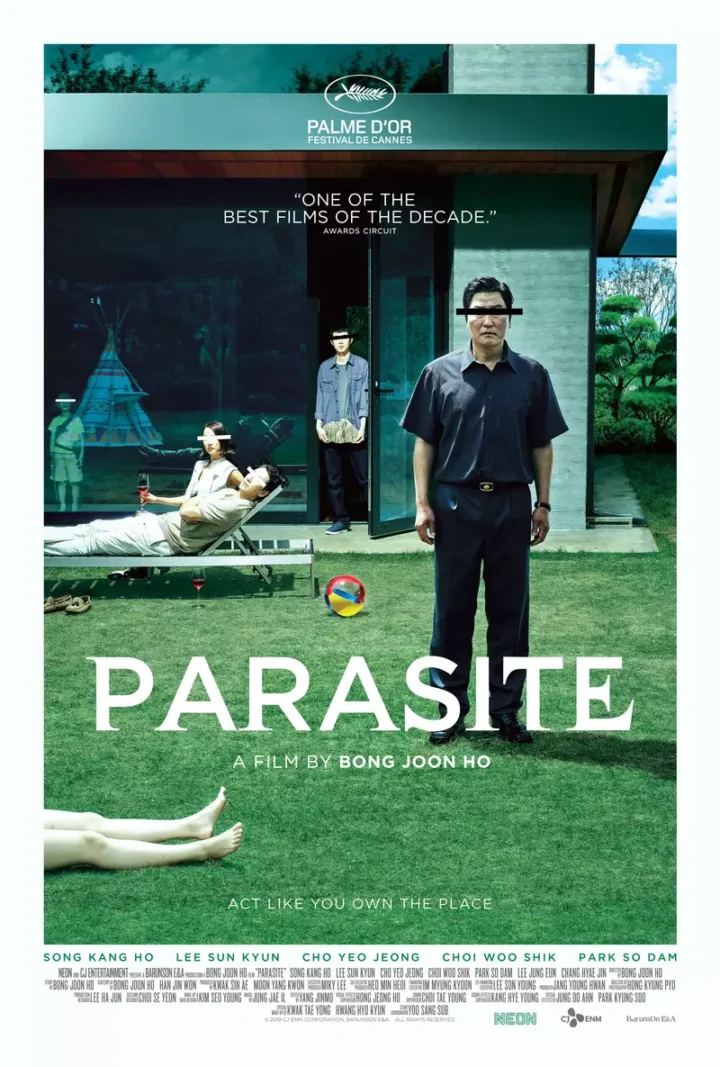

Plot, Themes, and Tone
Parasite, directed by Bong Joon-ho, tells the tale of the Kim family, who infiltrate the affluent Park family’s household through cunning deception. As the lines between the two families blur, a series of unexpected events unfold, leading to a thrilling and darkly comedic exploration of social class disparities and human nature. The film delves into themes of greed, inequality, and the inherent struggle for survival in a stratified society. The plot is intricate, unpredictable, and rich with symbolism. The tone of Parasite seamlessly shifts between dark humor, suspense, and poignant drama, creating a riveting cinematic experience.
Acting and Characters
The cast of Parasite delivers stellar performances, with each actor bringing depth and nuance to their respective characters. Song Kang-ho leads the ensemble as the patriarch of the Kim family, displaying a compelling mix of cunning and vulnerability. Cho Yeo-jeong shines as the oblivious Mrs. Park, while Choi Woo-shik and Park So-dam portray the resourceful Kim siblings with charm and complexity. The supporting cast, including Lee Sun-kyun and Jo Yeo-jeong, add layers to the film’s exploration of class dynamics and social commentary.
Direction, Score, and Cinematography
Bong Joon-ho’s direction in Parasite is masterful, seamlessly blending genres and tones to create a mesmerizing and thought-provoking narrative. The score, composed by Jung Jae-il, complements the film’s shifting moods, adding depth and emotion to key moments. The cinematography is striking and immersive, capturing the stark contrast between the Kims’ cramped basement apartment and the Parks’ luxurious home with visual flair and symbolism.
Production Design, Special Effects, and Editing
The production design of Parasite meticulously captures the divide between the two social classes, with contrasting sets that reflect the characters’ realities. The special effects, while subtle, enhance the film’s narrative twists and thematic resonance. The precise and dynamic editing maintains a taut pace, heightening the tension and suspense as the story unfolds towards its gripping conclusion.
Pace and Dialog
Parasite unfolds at a captivating pace, allowing viewers to fully absorb the intricate layers of the story and the complex dynamics between the characters. The dialogues are sharp, witty, and laden with subtext, reflecting the power struggles and social commentary at the heart of the film. The blend of humor, drama, and social critique in the dialogues adds depth and resonance to the characters and their interactions.
Emotional Impact and Audience Resonance
Parasite leaves a profound emotional impact on viewers, drawing them into a world of shifting loyalties, societal critique, and the blurred morality of survival. The film’s examination of class inequality, human nature, and the consequences of unchecked ambition resonates with audiences, prompting reflection on privilege, poverty, and the inherent complexities of the human experience. Parasite’s twisty narrative, dynamic characters, and social commentary make it a cinematic tour de force that stays with viewers long after the credits roll.
Audience Section
Audiences have been captivated by Parasite’s gripping narrative, stellar performances, and thought-provoking commentary on class divisions and societal struggles. The film’s exploration of greed, morality, and the repercussions of social disparity has garnered a dedicated following among fans of international cinema, social satire, and complex storytelling. Parasite’s blend of dark humor, suspense, and social critique continues to resonate with viewers seeking a cinematic experience that challenges conventions and provokes deep reflection.
In conclusion, Parasite is a captivating and multi-dimensional masterpiece that deftly navigates the complexities of class divides and human nature. Its compelling storytelling, rich performances, and sharp social commentary make it a must-watch for fans of thought-provoking and thematically rich cinema.




